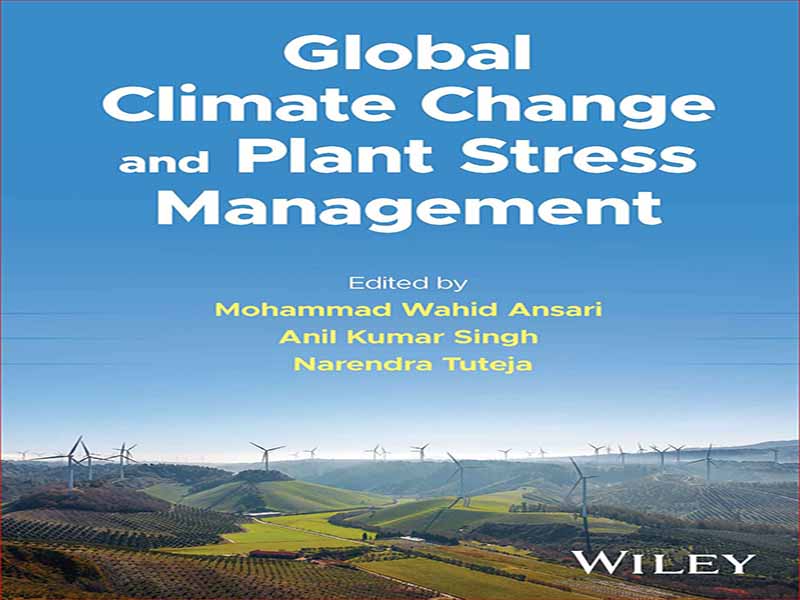- عنوان کتاب: Global Climate Change and Plant Stress Management
- نویسنده/انتشارات: Mohammad Wahid Ansari
- حوزه: تغییرات آب و هوا
- سال انتشار: 2023
- تعداد صفحه: 462
- زبان اصلی: انگلیسی
- نوع فایل: pdf
- حجم فایل: 12.6 مگابایت
وجود موجودات زنده به غذای سنتز شده توسط گیاهان عمدتا سبز با جذب انرژی از نور خورشید از طریق فرآیند فتوسنتز بستگی دارد. در حال حاضر، یک چالش جهانی حفظ بهره وری محصول در یک محیط در حال تغییر برای پاسخگویی به تقاضای افزایش جمعیت است. با این حال، گزارشهای کنونی هیئت بیندولتی تغییرات اقلیمی به وضوح نشان دادهاند که فوریت برای اقدام در مورد تغییرات آب و هوایی جهانی و تولید محصولات کشاورزی تاکنون به خوبی درک نشده است. نیاز مبرمی به سیستمهای غذایی کشاورزی برای تطبیقپذیری بیشتر برای تأثیرات موجود و آتی تغییرات آب و هوای جهانی وجود دارد، که میتوان از طریق یادگیری از شیوههای برتر، تشویق استراتژیها، برنامهها و اقدامات بعدی تعدیل دگرگونکننده به آن دست یافت. گرایش فزاینده به سمت تغییرات آب و هوایی در چند دهه گذشته به شدت به تولید محصولات جهانی در مقیاس بزرگ ضربه زده است. این تغییرات محیطی را تحمیل می کند که شامل شوری زیاد، دماهای بسیار بالا و پایین، کشش، سمیت فلزات سنگین و از دست دادن مواد مغذی، رشد باکتری ها، ویروس ها، قارچ ها، آفات مختلف و انگل ها، تهاجم حشرات مضر، و افزایش CO2 و اسیدی شدن اقیانوس ها می شود. این تأثیر بسیار مضری بر میکروبهای مفید، بهرهوری گیاهان، تلاشهای بازسازی و سلامت اکوسیستم خواهد داشت. انتظار می رود گرم شدن کره زمین منجر به روندهای بد آب و هوا، خشکسالی های طولانی مدت، سیل و غرقابی، طوفان و افزایش بروز بیماری شود که باعث تغییر رشد، اختلال در فتوسنتز و کاهش پاسخ های فیزیولوژیکی در گیاهان می شود که تولید محصولات کشاورزی را محدود می کند. سیستم های کشاورزی پایدار جهانی به دلیل افزایش دما، خشکسالی و تنش های شوری در معرض خطر هستند. بر اساس گزارش جدید سازمان جهانی هواشناسی (WMO)، تأثیر تنش آبی و خطرات خشکسالی، از جمله خشکسالی خشک و سیلابهای طاقتفرسا، جوامع و اکوسیستمهای آفریقا را درهم شکسته است. استراتژیهای مقابله با افزایش غلظت CO2 و گرم شدن کره زمین و افزایش تحمل گیاه به تنشهای غیرزیستی و زیستی، اهداف مهمی برای تولید کشاورزی پایدار هستند. پیشرفت های اخیر در علم، مانند ویرایش ژنوم مبتنی بر پروتئین (CRISPR-Cas) مرتبط با CRISPR (Cas) و ابزارهای “Omics” مانند ژنومیکس، رونویسی، اپی ژنومیک، پروتئومیکس، متابولومیکس و فنومیک، دقت و سرعت را در پیشرفت برنامههای اصلاح مولکولی گیاهان برای توسعه تنوع گیاهی غنی شده با مواد مغذی و مقاوم به استرس، که ممکن است بازیگران کلیدی در تضمین امنیت غذایی باشند. علاوه بر این، پتانسیل قابل توجهی برای توسعه محصولات انعطاف پذیرتر و هوشمندتر از نظر آب و هوا برای پاسخ به تهدید فزاینده تغییرات آب و هوا و اثرات نامطلوب آن بر محصولات کشاورزی کمک خواهد کرد. در کتاب حاضر، تغییر اقلیم جهانی و مدیریت استرس گیاهی، مجموعه ای از 27 فصل توسط 80 متخصص از 12 کشور مختلف – استرالیا، انگلستان، جزیره فیجی، ایتالیا، هند، ایران، ژاپن، پادشاهی عربستان سعودی، نپال، آمریکای جنوبی و بریتانیا. این کتاب مروری بر تحولات اخیر در تولید کشاورزی پایدار در یک محیط در حال تغییر ارائه می دهد. هدف این کتاب تأکید بر مسائل تغییرات آب و هوایی جهانی و ناامنی غذایی برای میلیاردها نفر است، با این فرض که در دوره آینده با گرسنگی شدید روبرو خواهند شد. این بر همه نگرانیها در مورد چرخههای کربن و مواد مغذی، گرم شدن کره زمین و استرسهای محیطی که تحت سناریوی تغییرات آب و هوایی جهانی منشأ میگیرند و در نتیجه بر تولید کشاورزی اساسی که فقرای رایج جهان به آن وابسته هستند، تأثیر میگذارد، تأکید میکند. این کتاب همچنین راههای بالقوه کاوش، بررسی، و اتخاذ تکنیکها و ابزارهای جدید، روششناسی و اختراعات علمی را برای درک نتایج آب و هوا بر امنیت غذایی ارائه میکند. دانش ارائه شده در اینجا ممکن است برای کشاورزانی الهام بخش باشد که ممکن است طبق آب و هوای پیش بینی شده به محصولات مفید پاسخ دهند. این ادراک هم برای دانشمندانی که برای پیشبینی تهدیدات آب و هوایی جهانی متهم شدهاند و هم برای سیاستگذارانی که مسئول تصمیمگیریهای تاثیرگذار در این زمینه هستند، به معاملات خوبی منجر میشود. کتاب حاضر به طور خاص برای دانشجویان علوم زیستمحیطی و زیستشناسی درگیر در تحقیقات بینرشتهای، پژوهشگران، دانشمندان جوان و اعضای هیئت علمی مناسب است. از مرحوم پروفسور R.C. پنت و دکتر الوک شوکلا که در مرحله اولیه این کار به ما کمک کردند.
The existence of living organisms depends on the food synthesized by mainly green plants by capturing energy from sunlight through the process of photosynthesis. At present, a global challenge is to sustain crop productivity in a changing environment to meet the demand of increasing population. However, the current reports of the Intergovernmental Panel on Climate Change have made clear that the urgency to take action on global climate change and agrifood production is not well understood so far. There is an urgent need for agrifood systems to be more versatile to the existing and upcoming impacts of global climate change, which could be achieved through learning from superior practices, encouraging transformative adjustment strategies, plans, and its subsequent actions. A growing tendency toward climate change for the past few decades has badly hit global crop production on the large scale. It imposes environmental variations that include high salinity, very high and low temperatures, draughts, heavy metal toxicity and nutrient loss, the growth of bacteria, viruses, fungi, different pests, and parasites, harmful insect invasions, and increased CO2 and ocean acidification. This will have a considerably harmful impact on beneficial microbes, plant productivity, restoration efforts, and ecosystem health. Global warming is expected to elicit harsh weather trends, long-lasting droughts, floods and waterlogging, storms, and increased disease incidence, which cause altered growth, impaired photosynthesis, and reduced physiological responses in plants that limit agrifood production. Global sustainable farming systems are at risk owing to rising and co-occurring temperatures, droughts, and salinity stresses. According to a new report from the World Meteorological Organization (WMO), the impact of water stress and drought hazards, including withering droughts and overwhelming floods, is thrashing African communities and ecosystems. The strategies to deal with increased CO2 concentrations and global warming and enhance plant tolerance to abiotic and biotic stresses are important targets for sustainable agricultural production. Recent advances in science, such as CRISPR-associated (Cas) protein-based genome editing (CRISPR-Cas) and “Omics” tools such as genomics, transcriptomics, epigenomics, proteomics, metabolomics, and phenomics, have enhanced precision and rapidity in the progress of plant molecular breeding programs to develop nutrient-enriched and stress-tolerant plant variety, which might be the key players in ensuring food security. Additionally, it will contribute a significant amount of potential for developing more resilient and climate-smart crops to respond to the rising threat of climate change and its undesirable effects on agrifood. In the present book, Global Climate Change and Plant Stress Management, we present a collection of 27 chapters by 80 experts from 12 different countries – Australia, England, Fiji Island, Italy, India, Iran, Japan, Kingdom of Saudi Arabia, Nepal, South America, and the United Kingdom. This book offers a current overview of recent developments in sustainable agriculture production in a changing environment. This book aims to accentuate issues of global climate change and food insecurity for billions of people, assuming they will face drastic hunger in the upcoming period. It emphasizes all concerns about carbon and nutrient cycles, global warming, and environmental stresses originating under a scenario of global climate change and thereby badly affecting basic agriculture production, on which the common world’s poor depend. This book also presents the potential ways of exploring, investigating, and adopting novel techniques and tools, methodologies, and scientific inventions to realize climate’s outcomes on food security. The knowledge convened herein might be inspiring to farmers who may respond to beneficial crops as per the foretold climate. This perceptive will result in good dealings for both scientists indicted for predicting global climate threats and policymakers responsible for influential decisions in the field. The present book is specifically appropriate for environmental and biological science students engaged in interdisciplinary research, research scholars, young scientists, and faculty members. We thank the late Prof. R.C. Pant and Dr. Alok Shukla who helped us during the initial phase of this work.
این کتاب را میتوانید از لینک زیر بصورت رایگان دانلود کنید:





































نظرات کاربران